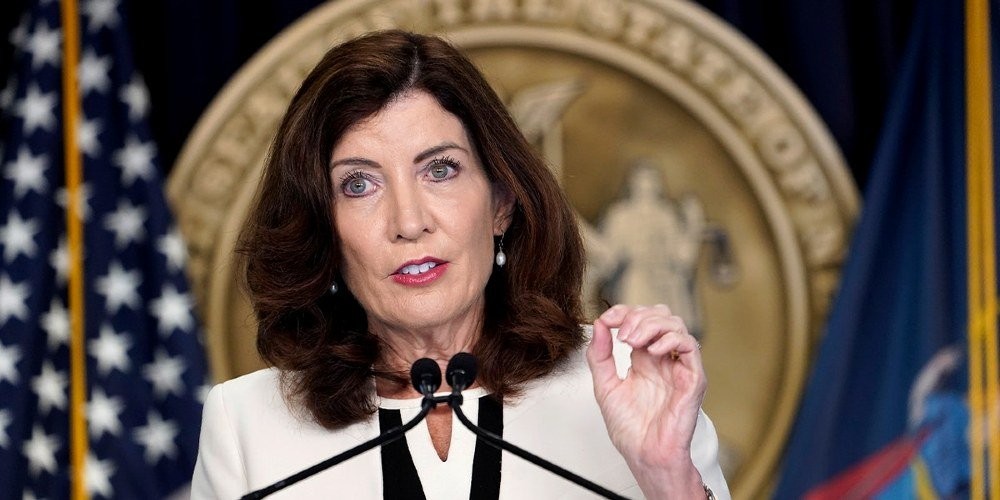![]() (DCNF)—New York is poised to fine energy companies billions of dollars in the name of fighting climate change under a new law that will likely make life more costly for ordinary consumers.
(DCNF)—New York is poised to fine energy companies billions of dollars in the name of fighting climate change under a new law that will likely make life more costly for ordinary consumers.
Democratic New York Gov. Kathy Hochul signed Senate Bill S2129B on Thursday, enacting a law that will require energy companies to cough up $75 billion to the state over 25 years to atone for their supposed roles in causing climate change. Aside from standing on questionable legal footing, the new law essentially amounts to a state revenue grab that will ultimately increase costs for consumers if fully implemented, according to energy and legal experts.
“When you dig beneath the headlines, the story here is very simple: New York State is choosing to punish industries that it doesn’t like, which power everyday activities, and use the money it’s confiscating to fund pet projects and various progressive lifestyle choices that couldn’t get funded by Bernie Sanders and Democrats in Congress,” O.H. Skinner, executive director of the Alliance for Consumers, told the Daily Caller News Foundation. “While China and other adversaries continue to pump carbon into the atmosphere, New York liberals are using the guise of ‘fixing climate change’ to try and bankrupt companies they don’t like and unlock money for their liberal wishlist. This shakedown is horrible for everyday people.”
New York On Track To Miss Deadlines On Majority Of Its Lofty Climate Goalshttps://t.co/vKEHsxkaDC
— Daily Caller (@DailyCaller) July 20, 2024
Hochul’s office says that New York will take the funds it rakes in under the superfund law to pay for projects that will enhance the state’s “resiliency to dangerous climate impacts.” Examples of the projects funded by the law would include upgrades to drainage systems, “preventive health care programs,” retrofitting buildings to be more green and developing “green spaces” in urban environments among others, according to the law’s text.
State officials will determine how much each affected company must contribute to the superfund based on how much carbon dioxide they emitted between 2000 and 2018.
Upon signing the bill, Hochul’s office proclaimed that the new superfund law will “[shift] the cost of climate adaptation from everyday New Yorkers to the fossil fuel companies most responsible for the pollution.”
However, Ken Girardin, director of research for a New York-focused think tank known as the Empire Center, said that the new statute will hit consumers the hardest as the affected corporations seek to recover costs by passing the expense along to their customers.
“I don’t think that this law will ultimately be implemented, as New York is trying to thread multiple legal needles at once,” Girardin told the DCNF. “That aside, if these costs were to be levied, it would be entirely within the companies’ rights to recover those costs, basically in New York exclusively. They could levy a geographically-focused surcharge … If a company gets targeted by this program, it stands to reason that they would recover their costs by raising prices in New York specifically.”
Even without the new superfund bill in effect, New York has some of the highest average gas prices of any state in the U.S., trailing only eight other states, according to AAA gas price data. Moreover, the cost of electricity for commercial, residential and industrial customers in New York is higher than the national average cost for each type of customer, in some cases by as much as 50% as of October, according to data from the U.S. Energy Information Administration.
Scott Segal, a partner at Bracewell LLP who advises energy companies on the implications of climate legislation, said that the new law will likely only intensify existing concerns about New York’s hostile business environment.
“While we all share the goal of addressing climate change, imposing retroactive liability on companies for legally-conducted business activities sets a troubling precedent that could significantly impact New York’s business environment and economic competitiveness,” said Segal. “Unlike its namesake federal statute that dealt with waste activities, the use of fossil fuels is and was an essential component of maintaining quality of life in New York and elsewhere.”
“There’s a real risk that these costs will ultimately be passed on to New York consumers through higher energy prices,” Segal added. “At a time when many families are already struggling with high costs of living, we need to carefully consider the downstream economic impacts of this policy.”
Vermont enacted a similar piece of legislation in June, and other blue states including Massachusetts and Maryland are also reportedly considering rolling out their own comparable versions of a superfund bill, according to Insurance Journal. Moreover, New York state and city — as well as numerous other Democrat-controlled jurisdictions across the country — have sued energy companies in pursuit of billions of dollars of damages with “climate nuisance” litigation, though none of those cases have so far led to a major verdict or settlement with the plaintiffs.
Hochul’s office did not respond to a request for comment.



